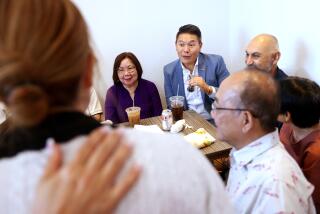‘A Seed of Love’
- Share via
A group of doctors and nurses led by Fountain Valley pediatrician Quynh Kieu returned recently from a medical mission to Vietnam with memories of grateful patients glowing in their minds.
Carting the essentials of a modern-day operating room with them, the group--which included a number of Vietnamese Americans--worked to repair the faces of disfigured children.
But they knew what to expect back home in Orange County: criticism.
Even before the group left, commentators on Vietnamese-language radio “were criticizing us, saying we were deluding ourselves if we thought we were changing the Communists,” Kieu said. “But that’s not why we went. We were there to give a new lease on life to 52 people. The life of a child is worth facing a little controversy.”
Humanitarian aid to Vietnam remains a contentious issue within the Vietnamese American emigre community, where wartime bitterness against the Communist government still runs high.
But a new generation of Vietnamese Americans is braving censure to bring help to the country their parents left.
“It’s time that we inform people around here that the younger generation still have a seed of love in them for the homeland,” Kieu said. “That is something we should encourage, not try to kill.”
Before the United States lifted its trade embargo in 1994, those who advocated normalizing relations with Vietnam found protesters on their doorsteps. Businesses that had contact with Vietnam were shunned.
Although the climate is slowly warming, those who support aid to the country still risk being labeled Communist sympathizers.
The bitter emotions are strongest among the older generation of exiles, parents who lived through the turmoil of the Communist victory in Vietnam.
As a result, groups pursuing humanitarian missions to Vietnam traditionally keep their efforts low-key.
“We have so many young Vietnamese Americans who have gone back to help and yet are so shy about speaking out and letting people know,” said pediatrician Mai Khanh Tran, a member of the medical mission. “That’s a shame.”
Increasingly, however, many young Vietnamese Americans are less concerned about a past war than about helping the future of their homeland.
“My father didn’t speak to me for six months after my first trip in 1994. But now I go once or twice a year,” Tran said. “I’m comfortable that what I’m doing is helping people.”
Kieu said her participation was made easy by the desperate state of health care in the country.
“Given the high infant mortality rate there, we knew we didn’t have time to wait. We accepted the risk of being labeled sympathizers,” Kieu said.
The 10-day trip was sponsored by Medical Mission Foundation, a nonprofit group that sends medical teams to poor countries. Orange County provided half of the 26-member group, including surgeons, pediatricians, anesthesiologists and nurses.
They sent ahead 1,000 boxes of medical supplies and equipment donated from groups across the country, including Fountain Valley Regional Hospital and Medical Center, Social Assistance Program for Vietnam, and Counterpart.
Arriving at Ninh Binh General Hospital, a 350-bed facility that serves the province of 2 million people, the medical team found lines of families waiting. Most of their patients were children. All of them had facial deformities that would have affected them for the rest of their lives.
“Some of the things we saw were unreal, like what you’d see in the movies,” said nurse Debra Clark, one of four who came from Fountain Valley Regional Hospital. “What the kids were coming in with would have been treated here a long time ago. The things we did will change their lives. It’s so wonderful to know you made a difference.”
Over the course of five days, the medical team operated on 52 cases, removing tumors and performing reconstructive surgery on faces scarred by cleft lips and palates. Working in fairly primitive conditions, they found themselves improvising with limited equipment.
“The things we take for granted here--monitors, the EKG, oxygen tanks--just weren’t available,” Clark said.
The team also spent time with the hospital’s doctors and nurses, giving lectures on the latest medical techniques. “We wanted to give them the tools to help themselves after we left,” Kieu said.
The tearful thanks of parents and patients made the trip worthwhile, said nurse Mary Ann Alvarez of Fountain Valley, who took vacation time to go on the mission.
One of the fathers of a cleft-palate patient came up to her afterward, she said. “At first I didn’t understand what he was saying. Then someone explained that he was thanking me for bringing a smile to his son’s face. His son was writing ‘Thank you’ to me in English. . . . I can’t wait to go next year.”
It’s experiences like that one that made pediatrician Tran realize how essential it is to continue the work she has been doing in Vietnam, despite the objections of some community members.
“I think, slowly, the Vietnamese community is becoming more accepting,” she said. “But I know it takes time. I hope the community realizes what we do and will be more receptive and open to our own who want to go and work there.”
More to Read
Sign up for Essential California
The most important California stories and recommendations in your inbox every morning.
You may occasionally receive promotional content from the Los Angeles Times.









